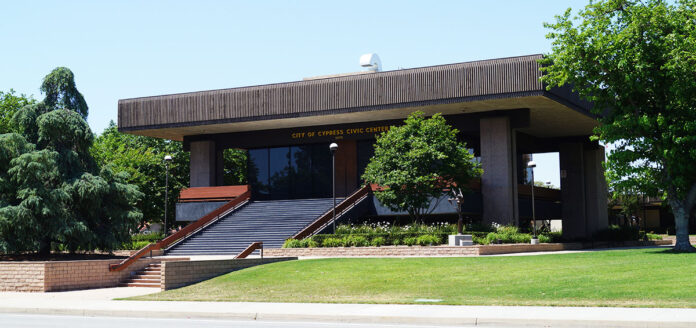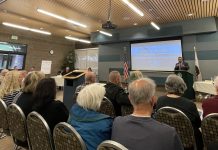A suggestion of having the city transcribe its meetings to make them available to deaf residents fueled an uncomfortable exchange between the city manager and residents Monday at the regular Cypress city council meeting.
Amid ongoing complaints of a lack of transparency, the Council denied a request to have city council meetings transcribed where their words would live in an unvarnished document available to everyone and especially those hard of hearing or deaf.
Councilmember Frances Marquez suggested the Council could better adhere to the federal Americans with Disabilities Act (ADA) requirements by providing a published, unedited transcript of the city council meetings for citizens with hearing problems or disabilities on the city’s website.
During a discussion of the city’s technology master plan, she suggested making a public transcript an addition to the city’s technology master plan, which does include technology for closed captioning.
“I wanted to see in the master plan, if we can get so a statement of the whole meeting listed and typed a transcript to meet ADA requirements,” said Marquez. Although there were other items in the plan that addressed special needs, Marquez said “I did not see that in there. I could have missed it but I just wanted to ask for that.”
Almost immediately, City Manager Peter Grant began throwing shade on the idea, suggesting he was not given sufficient time to plan for the discussion.
“This isn’t something that we were aware you’re going to ask about this evening,” said Grant. He said the city’s technology master plan does include some accessibility items, specifically, closed captioning on broadcasts of the council meetings.
Grant said he was not sure whether there’s an automated transcript option available “for what you’re proposing.” He suggested such technology could be expensive but noted he did not know the answers without further examination.
“If it’s something that the city council would like us to look into, the proper forum for that under your protocols would be through the strategic planning process,” said Grant, “or it would have been at the budget workshop a couple of weeks ago.”
“Having said that, if it’s something that the council is interested in and there’s majority direction to investigate it, and the cost, which I’m sure would be substantial, we’d be happy to report back,” said Grant.
“As a point of reference,” said city attorney Fred Galante, “I don’t know of any ADA requirement that obligates the city to do that.”
Galante did say “I think it would be just within the city’s discretion if that’s some additional resource you’d want to provide people that are unable to hear the audio,” he said.
“Is there anyone else wanting that direction,” asked Mayor Paulo Morales? “I just don’t see its purpose,” he said.
When no other member spoke in favor of providing transcripts for the public, especially for the hard of hearing and deaf residents, Council member Jon Peat made motion to “approve the city of Cypress technology master plan as proposed,” meaning that for now, there would be no further discussion of a transcript since it was not included in the plan.
The Council passed the motion unanimously to approve the technology master plan as proposed, without including any provisions to provide a written transcript of the proceedings.
However, that was not the end of the discussion. During the next open communications session, citizens disagreed with Grant, suggesting that providing a written transcript was a good idea.
“I was troubled, definitely troubled by the almost discounting of Dr. Marquez’ suggestion that we provide a transcript for people in the community that are hard of hearing, or deaf or whatever,” said resident Marilyn Reames. “I thought, what a simple thing to do that could address members of the community that do have those disabilities, and why in the world not,” she wondered.
“I thought that would be something that everyone on the council would go wow, that’s a great idea. I hope you reconsider that whether you will or not, I don’t know,” said Reames.
Long time Cypress resident, and engineer Edwin Kraemer, said “I thought there would be a software solution to this, adding that his three daughters have all learned sign language and have a heart to help people who are deaf.
“I think that we should investigate doing what we can to transcribe these meetings into something that people who are missing one of their senses can then experience, you know, interact, so we can support that,” said Kramer. “I don’t think it’s prohibitively expensive.”
Activist Brittney Cook revealed that an operation earlier in her life to remove a brain tumor left her deaf in one ear.
“It’s hard for me to hear atnight on my phone,” said Cook. “I can hear much better in person because luckily that giant room you’re in, echoes,” she said. “But it’s just it’s something (transcripts) that I feel like maybe we shouldn’t move on too quickly from,” said Cook.
“There’s a lot of people, and like I said it could be you, anyone could lose their hearing overnight. I don’t think it’s asking too much to ensure that things are accessible for people who maybe don’t have that sense,” said Cook.
“A lot of people brought up this issue tonight,” answered Morales, explaining “and it wasn’t just an issue of us quickly…just ignoring it or dismissing it,” he said, “and I’ll let the city manager speak to that.”
Grant turned his ire to citizens who suggested having a printed transcript was a good idea.
“Frankly, Ms. Cook and Mr. Kraemer’s comments were personally offensive to me,” said Grant, noting “they may not know that I have a special needs son.”
“My comments were neither dismissive nor were they about closed captioning, which is included in the recommendations in the technology master plan (passed earlier in the meeting).” Grant credited Marquez with suggesting the closed captioning “not long after she came onto the council,” which will soon become a reality.
Nevertheless, Grant said the new technology being implemented will, in fact, help “people who may have a disability that may make it difficult for them to participate in the city council meetings.”
He did, however, complain that Marquez had brought up the transcripts “with no advanced warning,” suggesting that council meetings could have “millions” of words in them. “That [transcription] is not a small undertaking in my professional opinion,” he said.Moreover, as a practical matter, Grant suggested a written transcript is “not primarily a disability access issue, as these transcripts would be available long after the meetings are completed.”
The city manager seemed to suggest the words themselves could be damaging if taken out of context or allowed the city residents’ comments to exist without accompanying explanations of the Council actions or motivations.
“I think everyone knows how much we appreciate public comments,” said Grant, but it is important that you engage with our explanations, consider our motives, and judge our decisions and our outcomes,” said Grant.
Grant is not a member of the Council, only an employee of the city.
Even so, city officials rarely explain after public comments and even more rarely offer any brief answers to residents asking hard questions.
Grant then actually shamed the taxpaying residents who merely suggested it was a good idea to publish transcripts of the meetings, and apparently only disagreed with Grant’s assertion that transcripts could be expensive.
“Shame on folks at the podium and over the phone, who are that coarse with folks who volunteer their time and their energy to sit on the city council and those of us who embrace their professional obligation to serve the community, everyone in the community,” the city manager said.












